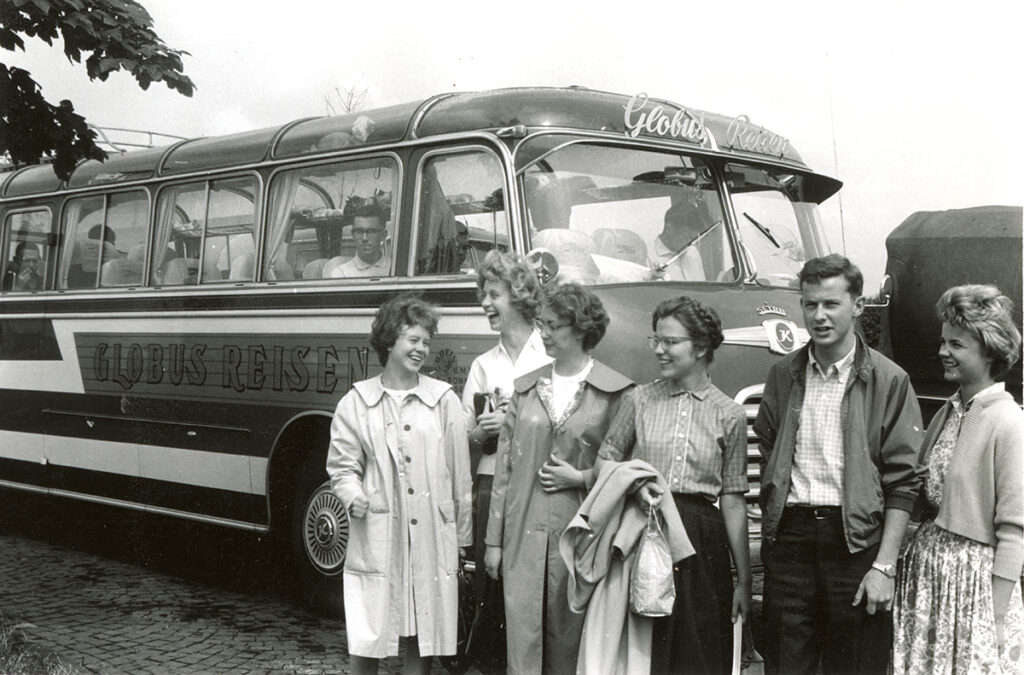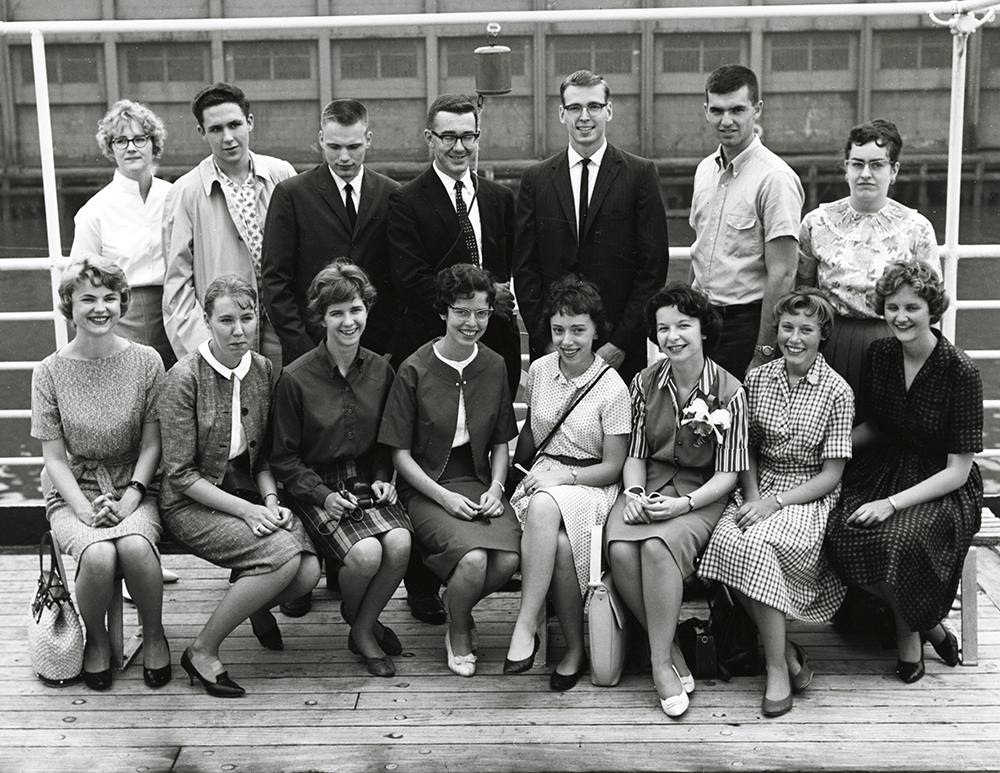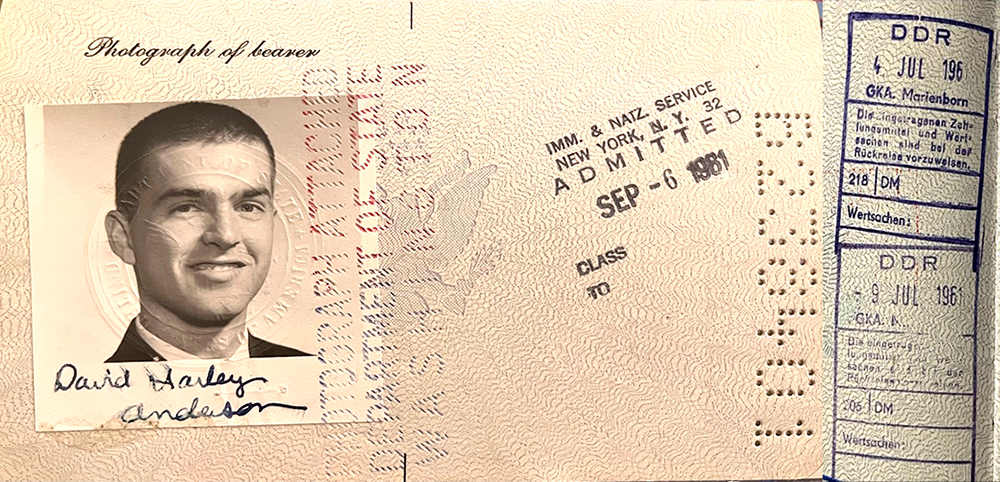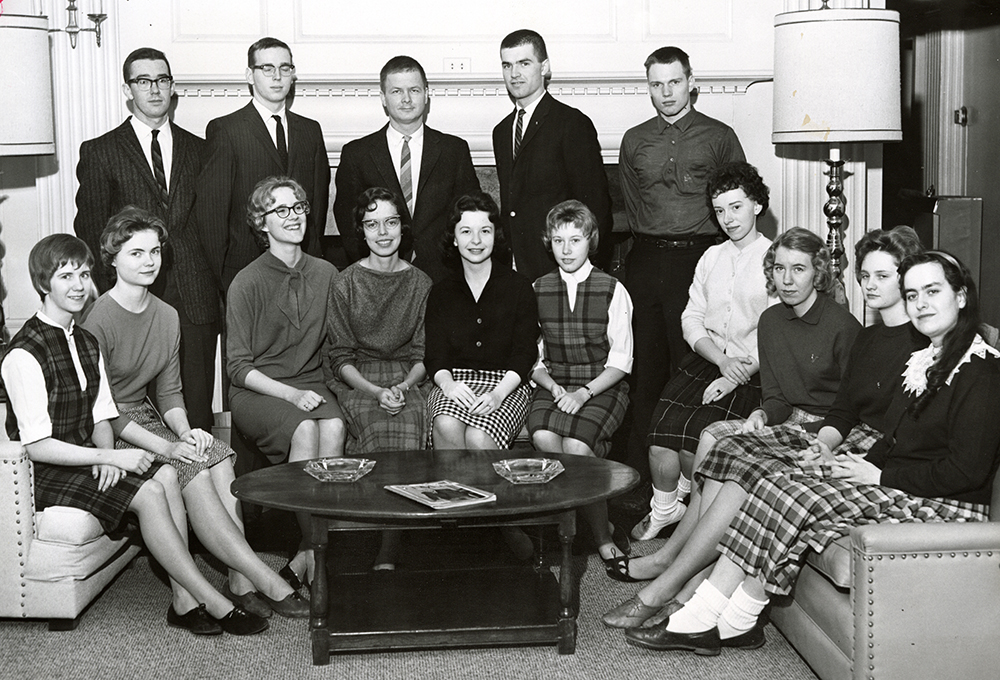
Reflecting on Light:
My K Experience Abroad in 1961 Post-War Germany
By David H. Anderson ’63
The Light Scholarship for Study Abroad, started in the 1950s, was one of the earliest programs in the nation providing funding for study abroad and one of the main reasons I chose to attend Kalamazoo College (other than the fact my parents met there in the library while my future dad strummed the rubber band on a book).
Along with 25 or so other German language students, I received a Light Scholarship to attend the University of Bonn in 1961 as a 19-year-old sophomore. We left by ship from New York, arrived in France and took a train to Bonn. The city had been selected as the capital of West Germany, as it had relatively little war damage. The campus was beautiful, mostly undamaged, and overlooked the lovely Rhine River.

I lived with a German family who was warm and inviting. One day, I noticed some medals on a cabinet, and I asked (carefully) what they were for. My German father hesitated and then said it was from the war. The next day they were gone from the shelves. It was just 16 years after the end of World War II, and he had obviously been a part of the Nazi army. I didn’t ask him any more about that.
One of the highlights of the trip was a week in Berlin. In early July, we boarded a bus and went to the border leading into East Germany, controlled, obviously, by the Russians. The checkpoint was armed on both sides by Western and Eastern military. They boarded our bus and loud German language was exchanged. Suddenly, they pointed at me! I was a bit scared. But they needed to stamp one passport, and since my last name began with an A, they selected me. I still have that passport for entering East Germany, and by chance it was July Fourth!
Our time in West Berlin was very interesting. It was controlled by WWII Allies America, England and France, while East Berlin was controlled by the Russians. West Berlin was considered an island of freedom, as it was surrounded by Russian-controlled land.
We took classes in German and also witnessed a lot of damage from the war, whole blocks destroyed and rubble everywhere. One notable thing was that the trees in parks had just begun to recover. During the winters after the war, there was little fuel for heating homes, so trees were cut down for fuel. But we enjoyed the city, the beer, the food and a stuffed doughnut called a Berliner. We were easily able to go under the Brandenburg Gate to the more damaged East Berlin, and to stand on the remnants of Hitler’s Bunker, where he died by suicide 16 years earlier. There was some barbed wire in places, but no wall!
In an attempt to encourage more tourism to West Berlin, we met for a few minutes with the mayor. He welcomed us, shook our hands, and asked a bit about us. This was Willy Brandt, who would become the chancellor of West Germany in 1969.
After returning to Bonn and our host families, we saw greater tension emerge between East and West Berlin and then the start of the Berlin Wall. History states the date as August 13, 1961, a month after we left. But sitting with our families in Bonn, watching on their small black and white TVs, the barriers were started well before that, with barbed wire, fences, etc. to prevent East Germans from reaching freedom in the west. Nightly, we watched things get worse, shootings of people trying to get to the west. As the wall lengthened and grew, it became harder to cross, and more vivid scenes were seen. One night, my German father said, auf Deutsch (in German), “Why doesn’t America do something?” I had no answer for him.

In September, we returned to Kalamazoo, wiser, more knowledgeable about other cultures and their trials. We were better for it, thanks to Kalamazoo College and the Light Scholarship. This experience is valued by me even now, over 60 years later.
Two years later, on June 26, 1963, John F. Kennedy stood at the Berlin Wall, with my friend Willy Brandt next to him, and said the famous words: “Ich bin eine Berliner,” basically saying “I am a doughnut.” That’s the way I heard it. It was like saying “I am a Danish” rather than “I am Danish.” But the German citizens loved it!
David Anderson graduated from Kalamazoo College with a bachelor’s in biology and went on to earn his M.D. at Wayne State University. After serving in Bangkok during the Vietnam War, he returned to the University of Michigan for his residency in internal medicine. He served the community of Healdsburg, California, for more than 38 years, earning several awards of distinction before retiring in 2011. David and his wife, Catherine, are happy to live in “wine country,” Healdsburg.
Note: The Light Scholarship for Study Abroad is still a major source of financial support for study abroad. Thanks to funds including the S.R. Light Fund and the Arcus Gay and Lesbian Fund Study Abroad Endowment, the Center for International Programs is able to guarantee that students receive all of their normal financial aid while they are on study abroad just as when they are on campus. Kalamazoo College also has about 30 different named funds that specifically offer financial assistance to students studying abroad, including funds in honor of individuals and graduating classes as well as pooled or miscellaneous funds. The Center for International Programs also works with students to find and access external scholarships and grants as well as other sources of support.
